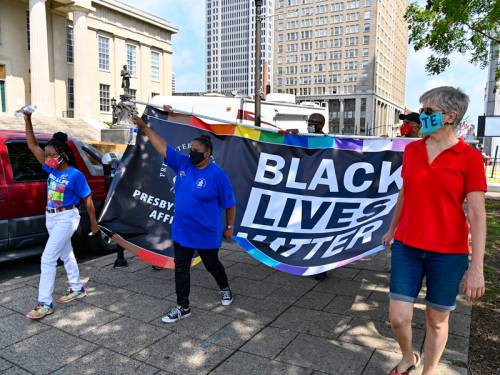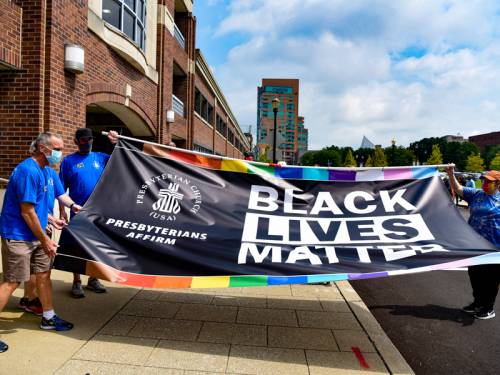About 150 Presbyterians and their partners rally and march for racial justice in downtown Louisville Saturday
by Mike Ferguson | Presbyterian News Service

About 150 Presbyterians and their partners marched for racial justice in downtown Louisville, Kentucky, Saturday as part of the Presbyterian Week of Action. (Photo by Rich Copley)
LOUISVILLE — Presbyterians and their partners in Louisville, Kentucky and in cities across the country took to the streets Saturday as part of the Presbyterian Week of Action, calling for an end to racial violence and attracting honks of support from motorists as the Louisville assembly of nearly 150 people marched from the Presbyterian Center to a downtown square honoring Breonna Taylor.
“The people, united, will never be defeated!” they chanted. “When Black lives are under attack, what do we do? Stand up, fight back!” “2-4-6-8, stop the violence, stop the hate!”

The Rev. Shanea D. Leonard was the architect of the Presbyterian Week of Action. (Photo by Rich Copley)
Once marchers had completed their eight-block hike, Week of Action architect the Rev. Shanea D. Leonard asked everyone to observe 8 minutes and 46 seconds of silence to honor the life of George Floyd. Toward the end of the silence, most marchers had raised a fist in solidarity.
Before they marched, those in attendance heard from several speakers; a singer, Carter Anderson; and poets. On two occasions, correspondents reported via social media on events occurring in other cities, including Baltimore and San Francisco.

Carter Anderson used his musical gifts to add to Saturday’s march and rally. (Photo by Rich Copley)
Opening Louisville’s three-hour rally and march with prayer, the Rev. Angela Johnson, moderator of Mid-Kentucky Presbytery and pastor of Grace Hope Presbyterian Church, offered thanks for God’s presence “thus far on the way,” through water hoses, ferocious dogs, beatdowns, pepper spray, rubber bullets, police brutality and murder. “If you hadn’t been on our side,” she told the Lord, “tell us — where would we be?”
“Like a tree planted near the water,” Johnson said, “we shall not be moved.”
Speaker after speaker implored the crowd to take concrete actions toward justice and away from violence.
“It’s not just hearing the Word,” said the Rev. Dr. Diane Moffett, president and executive director of the Presbyterian Mission Agency. “We’ve got to do the Word.”

“We aren’t being political,” by rallying, the Rev. Dr. Diane Moffett, president and executive director of the Presbyterian Mission Agency, told the crowd. “We are being deeply spiritual and moral. (Photo by Rich Copley)
“We aren’t being political” by rallying and marching, Moffett said. “We are being deeply spiritual and moral. All the commandments weigh on loving God and neighbor as ourselves.”
“Take all this energy to the polls in November,” she said. “Jesus came to effect not only the sweet by-and-by but to affect the nasty here-and-now. Vote like your life depends on it, pray like everyone depends on God — and act like everything depends on you.”
“Let’s go out into the streets of this city,” she said, “and be the re-presentation of Jesus, doing what we know God calls us to do.”

Ashe Helm-Hernández, co-founder of Tiger’s Eye Cooperative, speaks to the crowd gathered at the Presbyterian Center in Louisville, Kentucky on Saturday for the Week of Action march and rally. (Photo by Rich Copley)
“Are you on the freedom side?” asked Ashe Helm-Hernández, co-founder of Tiger’s Eye Collective in Louisville. “Stop being silent, and stop letting little remarks go by, because we die. … We are stressed, demoralized and traumatized — but we can’t stop. I may be preaching to the choir, but you have a chance each and every day you wake up to get up and to serve.”
“Too many Christian communities remain silent or fear retribution from their members,” said the Rev. Carlos L. Malavé, executive director of Christian Churches Together. He called on voters to “elect and work with leaders who understand the inherent dignity of all people … Many leaders flirt with white nationalism. Those leaders have no place in our government.”
“I pray God will raise up more faithful leaders in this time of reckoning,” Malavé said. “We must commit ourselves to being at the forefront of the fight for the soul of this nation and the dignity of all God’s children.”

Drummers the Rev. Dr. Alonzo Johnson, left, and the Rev. Marissa Galván-Valle lend their skills to Saturday’s march and rally. Event organizer the Rev. Shanea D. Leonard is at the microphone.(Photo by Rich Copley)
Alexander Griggs from Tiger’s Eye Collective shared a poem about inclusion on the day of his “manniversary,” marking the fifth year he’s been taking hormones. “Funny how we tailor our inclusivity to the people we feel comfortable including,” Griggs said. ‘There’s no room for your movement in this movement,’ they say. How quickly we forget that Black lives matter when that Black life is also transgender.”
Recalling Friday’s 65th anniversary of the lynching of 14-year-old Emmett Till, the Rev. Dr. Alton B. Pollard III, president of Louisville Seminary, said, “we all have stories of the racist pogrom we have experienced in this land.”
“The truth of the matter is the evils of racism are too much for much of white America. Sometimes it’s too much for Black and brown people to candidly consider and hear,” Pollard said.

Giving a “Wakanda Forever” salute, the Rev. Dr. Alton B. Pollard III, president of Louisville Seminary, greets the crowd Saturday. (Photo by Rich Copley)
Nearly six months after Taylor’s killing at the hands of Louisville police “in the self-proclaimed city of compassion, there still is no justice and no peace,” Pollard said. “My dearly beloved, this is why we march … In this and every generation, it is young people who have led the struggle and given us hope … We reject non-solutions, hollow answers, outright deceptions and formulaic answers.”

The Rev. Dr. Diane Moffett, president and executive director of the Presbyterian Mission Agency, helps lead Saturday’s march for racial justice in downtown Louisville. (Photo by Rich Copley)
“We are breaking the stronghold of silence,” he said. “We embrace our common humanity as allies, partners and friends … Our freedom is incomplete without the freedom of Black lives … The United States was born in violence, and to violence it consistently returns.”
“I would like to dream (the Rev. Dr. Martin Luther King Jr.’s) dream,” he said. “I’d like to think this is a different time, the first time in U.S. history when injustice against Blacks is made reprehensible and racial injustice matters to all Americans.”
“Love as if your life depends upon it, because, my siblings, it really does,” Pollard said. “Our vow today is we will continue to protest and vote with our masks on and our arms up, for love gives us strength.”

The Rev. Dr. J. Herbert Nelson, II, Stated Clerk of the General Assembly of the Presbyterian Church (U.S.A.), observes 8 minutes and 46 seconds of silence Saturday in Breonna Square. (Photo by Rich Copley)
After their march, participants returned to the Presbyterian Center, where Jud Hendrix, executive director of Interfaith Paths to Peace, described King’s four-step process for becoming the beloved community:
- Pray and worship as a way of connecting with the transcendent God.
- Tell the truth and hear it as well.
- “We must as the question, ‘What am I going to do to create a more equitable Louisville?” Hendrix said. “We need to be leading the conversation on reparations, because it’s a moral issue.”
- “The end result is the beloved community,” Hendrix said. “We ask for and offer forgiveness and come back into the beloved community of love, trust and kinship.

Marchers hiked a total of 16 blocks in downtown Louisville Saturday behind this banner. (Photo by Rich Copley)
The Stated Clerk of the General Assembly of the PC(USA), the Rev. Dr. J. Herbert Nelson, II, wrapped up the day by lamenting the persistence of the cash bail system, which can keep people in jail until their court date when a few hundred dollars — or less — could have freed them. Nelson also rued how much time it’s taken to decide whether to charge the three officers present when Taylor was killed by police in her Louisville apartment on March 13.
“From March to now — can’t we get a ballistics report?” Nelson asked. “We can’t get our Attorney General (Daniel Cameron) to speak and give an assessment of what has happened? The system remains quiet while we dilly-dally over who will have power, the mayor’s office or the police department.”
“There’s not an individual to blame,” Nelson said. “It’s a system all across the United States of America of people making money off of the vulnerable and those who have been dislocated. … In the end, people die on the vine, and we turn the page on another chapter in the same story.”

The Rev. Dr. J. Herbert Nelson, II, Stated Clerk of the General Assembly of the Presbyterian Church (U.S.A.), at right, speaks to a television reporter at the onset of Saturday’s march and rally. (Photo by Rich Copley)
When the General Assembly accepted the offer to move the headquarters of the reunited PC(USA) to Louisville in the early 1980s, “it came with a responsibility,” Nelson said. “Make sure the Breonna Taylors of the world are not trapped in the system. Thank you for doing just that by being here and witnessing,” he told those gathered.
“But it doesn’t stop here,” he said. “We must be an irritant to a justice system that has failed us, and we must be more faithful to a God who renders justice and is ready and willing to join hands with us, who will call upon a group of faithful people who will do what government, law enforcement and education can’t.”
Presbyterians “must do more than clap and sing on Sunday morning and get all happy by ourselves while the rest of the community is living in hell,” he said. “We march for Breonna Taylor today. I hope we don’t have to do it for anybody else tomorrow.”
“Today is a great beginning,” he said. “The question is, what do we do from here? We stand between community and chaos … Are we willing to put it on the line for those who need us in this hour? I know that’s a lot of questions, but if I were God, I’d be asking the same questions. It’s our responsibility to figure out what God is asking us to do and do it.”
“Our life doesn’t belong to us,” Nelson said. “It belongs to the One who woke us up this morning and gave us breath. Thanks be to God!”
See video highlights of Saturday’s march here.
![]() You may freely reuse and distribute this article in its entirety for non-commercial purposes in any medium. Please include author attribution, photography credits, and a link to the original article. This work is licensed under a Creative Commons Attribution-NonCommercial-NoDeratives 4.0 International License.
You may freely reuse and distribute this article in its entirety for non-commercial purposes in any medium. Please include author attribution, photography credits, and a link to the original article. This work is licensed under a Creative Commons Attribution-NonCommercial-NoDeratives 4.0 International License.